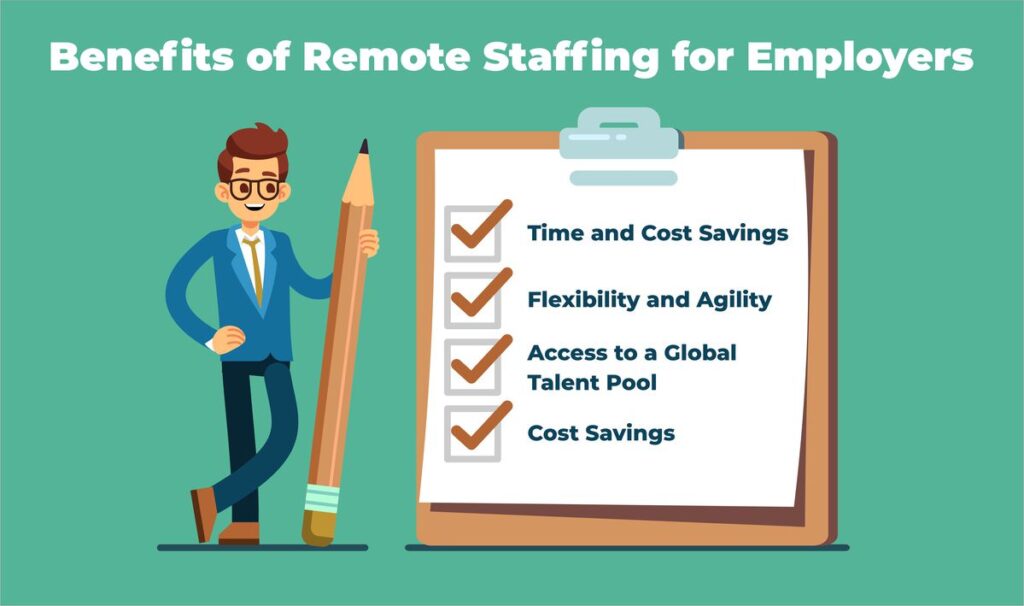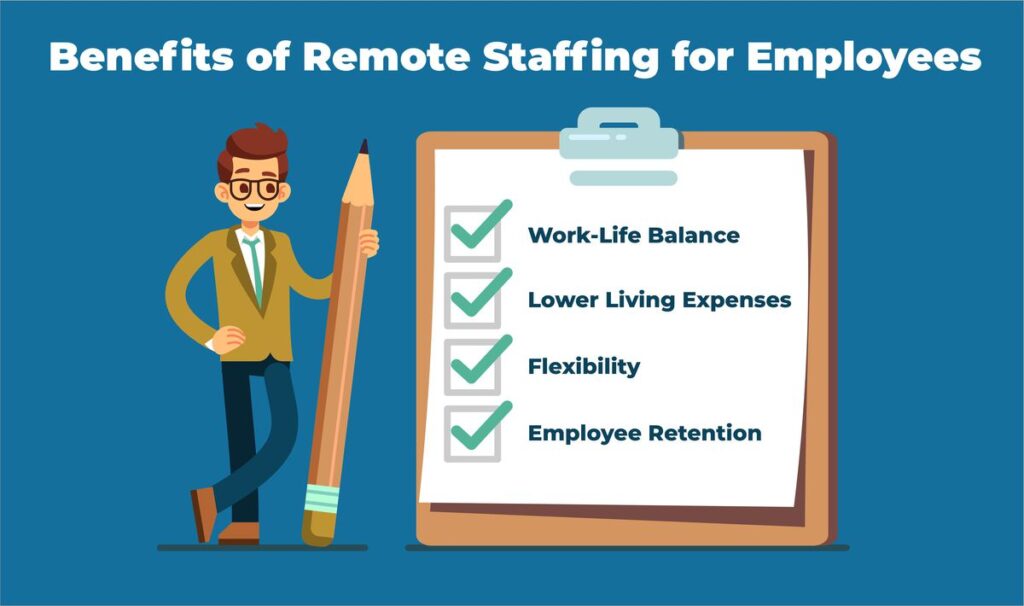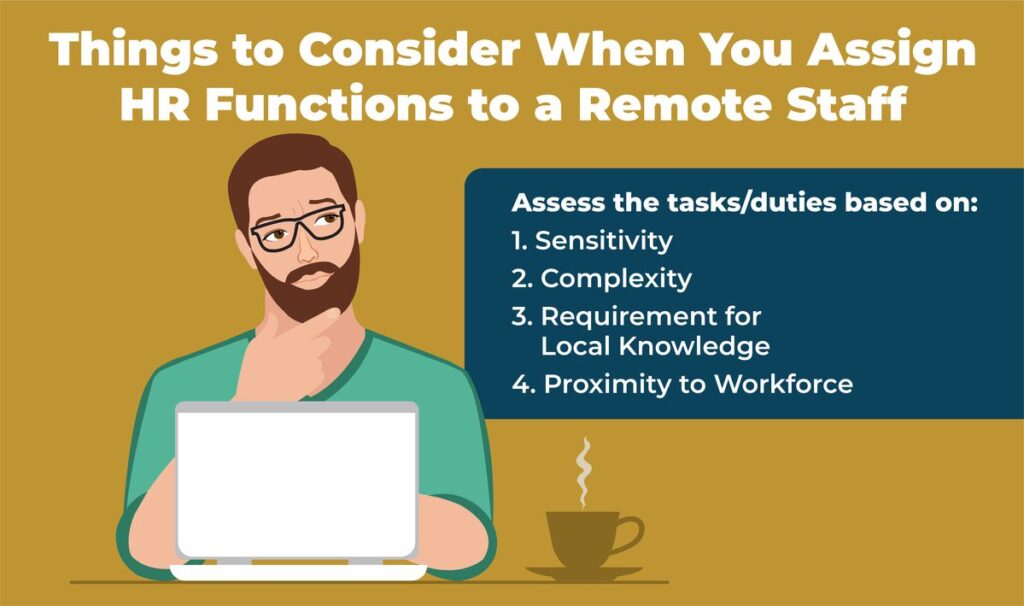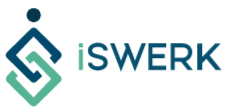
Introduction
Remote staffing has become increasingly popular in recent years, as it offers numerous benefits to both employers and employees. In the context of HR functions, remote staffing can streamline recruitment and onboarding processes, provide access to a global talent pool, and improve work-life balance for employees. This article will explore the benefits of remote staffing for specific HR functions, challenges, and considerations, as well as the evolving role of HR functions in the remote work landscape.
What is Remote Staffing?
Remote staffing, often known as remote work or telecommuting, is the practice of working outside of a regular office environment. Employees complete their tasks and duties from home, co-working spaces, or other distant places, using technology to stay in touch with their coworkers and employers. Remote staffing is one of the best business solutions, offering benefits to both employees and employers.
Remote staffing can offer several advantages to both employers and employees.
Benefits for Employers

- Time and Cost Savings: Remote staffing saves time and money on recruitment, training, and administrative responsibilities, allowing HR teams to focus on a more effective hiring process.
- Flexibility and Agility: Employers can recruit remote workers for short- or long-term assignments, full-time or part-time positions, or specialized tasks or projects.
- Access to a Global Talent Pool: Companies that use remote staffing have access to a bigger pool of candidates, increasing the likelihood of recruiting talented, diverse employees.
- Cost Savings: Remote work can lead to cost savings on office space, furniture, and other overhead expenses associated with maintaining a physical workspace.
- Increased Productivity: Remote employees have been found to be more productive, resulting in higher overall output and potentially lower costs for the employer.
Benefits for Employees

- Work-Life Balance: Employees who work from home can better balance their work and personal lives, which increases job satisfaction and reduces stress.
- Lower Living Expenses: Remote work can help employees save on transportation, housing, and other living expenses, especially in high-cost urban areas.
- Flexibility: Work from home jobs provide opportunity for personal and professional growth since employees can work from any location.
- Employee Retention: Remote work can improve employee retention rates, as employees appreciate the flexibility and work-life balance it offers.
Industries That Could Benefit from Hiring Remote Workers
Various industries could profit from recruiting remote workers, particularly in post pandemic. Some of the advantages of remote work include enhanced productivity, lower costs, a larger talent pool, greater adaptability, and lesser environmental impact. Some industries that are thriving with a remote workforce include:
- Banking
- Public sector
- Manufacturing and Distribution
- Healthcare
- Information Technology
- Advertising, Marketing, and PR
- E-commerce and Sales
- Recruitment
In the next section, we will explore the benefits of delegating your company’s HR functions to remote staff.
What is Human Resources (HR) and why is it important?
Human Resources (HR) is at the heart of company vitality, leading talent management and organizational synergy. It is a multifaceted function coordinating various critical elements required for a company’s success.
HR plays a crucial role in:
- Attracting and retaining top talent
- Fostering employee development
- Ensuring performance excellence
- Fostering a positive work environment
- Designing tailored compensation and benefits
- Adhering to regulatory standards
- Guiding organizational culture through changes
- Ensuring compliance with ethical standards
- Cultivating a thriving workplace culture
Basic HR Functions
Human Resource functions are dynamic, adjusting to each organization’s distinct characteristics, both in size and structure.
However, the essential functions include:
Recruitment and Selection | Finds and hires qualified candidates who fit the company’s specific needs and values. |
Training and Development | Equips employees with proficient skills and knowledge essential for their roles. |
Performance Management | Sets goals, monitors progress and gives insightful feedback. |
Compensation and Benefits | Crafts competitive compensation packages and benefit offerings tailored to attract and retain top talent. |
Employee Relations (ER) | Mediating employee concerns and fostering resolution in disputes. |
Health and Safety | Ensuring workers’ physical and mental health is a top priority in the workplace. |
Employee Wellness | Creating and supporting programs and projects that improve the health and well-being of all employees. |
Organizational Development | Guides the organization through transformative phases, adapting to and conquering emerging challenges. |
Compliance | Guarantees all laws and rules that apply to operations are always followed. |
Which HR functions can be managed remotely?
Remote staffing is an excellent way to manage various HR-related tasks.

Recruitment Process Outsourcing (RPO)
For a small or medium-size business, solutions to offshore or outsource recruitment processes include candidate sourcing, early screenings, and candidate pipeline management.
Administrative HR Tasks
HR departments conduct routine and repetitive operations like payroll processing, personnel record management, benefits administration, and tax compliance. Administrative HR remote jobs are easily assigned to individuals who have the necessary skills and tools.
Employee Helpdesk and Support
The role assists and guides employees on various HR-related matters, including policies, processes, benefits, and grievances. Offshore HR support services handle such concerns and other fundamental HR-related questions via contact centers or online support.
HR Analytics and Reporting
The position collects, analyzes, and reports on HR data such as employee performance, engagement, turnover, and satisfaction. Remote workers with the required skills and technology can fulfill these roles, helping organizations make more informed decisions and improve their HR strategy and procedures.
Some of the HR functions that could be challenging to manage through remote staffing are:
Compliance and Regulatory Support
Work-from-home staff can ensure compliance with regulations, ethical standards, and provide support remotely.
However, outsourcing compliance and regulatory support to distant employees may cause issues due to their unfamiliarity with local legal nuances and varying hazards and liabilities.
Training Content Development
This department develops and updates training materials and programs to improve employees’ skills, knowledge, and competencies.
When you hire remote workers to create training materials, it can be hard to make sure they understand the company’s goals, culture, and needs and have access to the same tools and comments.
Talent Management Services
This is the function that plans, develops, and executes strategies and activities aimed at attracting, retaining, and developing the greatest talent for the company.
Talent management services may include performance management, career development, succession planning, and employee engagement.
Hiring remote talent managers can be fierce because they might not have the same relationship with and trust for the workers or the same business vision.
HR Technology Support
This job provides technical assistance and maintenance for the company’s HR systems and software, which include applicant tracking systems, learning management systems, and employee self-service portals.
HR technology support can be tricky to outsource to work-from-home staff who may not have the same access and security to the HR systems and software or who may not have similar responsiveness and reliability.
Benefits and Compensation Analysis
Employees may receive wages, bonuses, incentives, health insurance, retirement plans, or other monetary or non-monetary benefits in return for their labor.
These benefits are designed, assessed, and managed by this department.
Delegating benefits and compensation analysis to remote professionals who may lack the same local market and industry expertise and experience, as well as the same authority and discretion, may be a concern.
Offboarding Processes
These are the staff in charge of managing employees’ departure from the company, which includes conducting exit interviews, gathering feedback, processing last payments, and removing access.
Offboarding processes can be delicate when outsourcing to distant staff who may not have the same connection and empathy with departing employees and the same level of control and oversight.
How does iSWerk address HR concerns in remote staffing?
Remote staffing provides a solution for handling many HR responsibilities but presents challenges with tasks such as compliance, training development, talent management, HR tech support, and benefits analysis.

When considering assigning HR responsibilities to remote workers, it is critical to evaluate jobs based on their sensitivity, complexity, and the requirement for local knowledge or proximity to the workforce.
iSWerk, a remote staffing division of iSupport Worldwide, overcomes these challenges with our top-notch talent ready to understand and embrace your local laws, aligned with business culture, equipped with appropriate tools, nurturing connections, and providing security and access to HR systems.
In conclusion
The shift toward remote work has changed HR functions in a way that has never been seen before, making them more flexible and efficient. Employers can find skilled individuals from around the world through remote work, and employees can enjoy a good work-life balance. Still, problems remain, especially when it comes to jobs that depend on local differences. But if these problems are handled strategically, they can open a world of new possibilities for HR to grow in the remote work era.
As the business world evolves, HR functions must adapt more than ever. Human Resource Management ought to welcome remote work to maximize flexibility, talent, and a healthy working environment, whether it’s a company’s core or non-core function.
Connect with iSWerk Today
iSWerk’s bespoke remote staffing solutions can help you enhance your workforce, unlock unmatched efficiency, and connect with a global talent pool to ease your HR responsibilities in the future.
